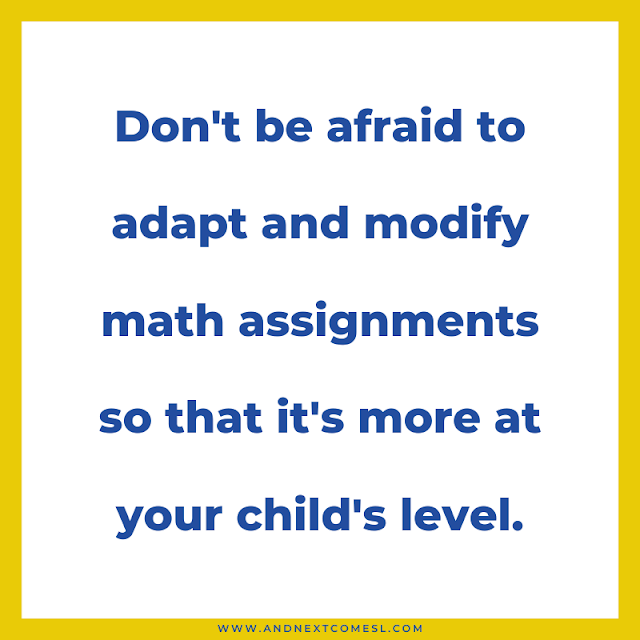When you have a little one who teaches themselves math and understands mathematical concepts well at such a young age, you might start to wonder: how on Earth will you possibly keep them challenged? Especially when they start school.
Well, for parents of kids identified with hypernumeracy, it's a common concern.
And for parents who maybe aren't great at math themselves, it might be an even bigger worry. How can you possibly keep up with their math skills if you don't understand the concepts yourself?
So whether you're good at math yourself or not, it's good to know what you can do to support your hypernumeric child's interests, stretch their minds, and keep them challenged as they grow.
After all, you know it's important to encourage a child's special interests and passions (see the benefits here).
So, let's take a look at some tips for keeping kids with hypernumeracy challenged. That way you have some ideas of how to support them, no matter what they're learning about or how old they are.
Tips for Keeping Kids with Hypernumeracy Challenged
Please keep in mind that some of the following tips might be best for certain ages. Also, some of the tips or suggestions below might not be options depending on what's available to you locally.
1. Provide them with math related toys, games, and manipulatives
One of the easiest things you can do is offer your child lots of toys, games, and manipulatives that cater to their interests and abilities.
That might be math puzzles, dice of various shapes and sizes, math games, pattern blocks or tangrams, dominoes, playing cards, snap cubes, geoboards, an abacus...there are lots of possibilities here!
Here are some suggestions:
- Prime Climb board game - Pretty sure I got my butt kicked every time I played this game...
- Pattern Blocks - Great for making colorful designs, learning geometry, and exploring patterns.
- SumBlox - I wish these existed when my son was a toddler! They are so cool!
You might also want to consider everyday tools here as well. After all, many tools, such as tape measures, measuring tapes, rulers, scales, clocks, stop watches, an old cash register, and calculators, are well-loved by hypernumeric kids. You would be amazed by the things these kids pick up and learn on their own, just by playing around with these types of items.
2. Enroll them in math clubs, camps, or challenges
A great way to keep a hypernumeric child challenged is to enroll them in a math club or similar. Not only will they get to build their skills and show off their abilities, but they'll also get to connect with peers with similar interests and foster social skills.
What is available, however, will obviously depend on where you live. For instance, some schools might offer math clubs or math challenges throughout the year, while others may not.
You could also try checking websites such as Outschool for math classes as a substitute for a math club or camp.
3. Introduce math related books
When they're younger, you can opt for picture books and stories that teach and explore various mathematical concepts. Then there are books like Everything You Need to Ace Math in One Big Fat Notebook that are a great option for when they get older.
Obviously, you can also look for textbooks or workbooks as well. More on that in a later tip though.
4. Use educational websites, apps, and videos
There are lots of great websites, apps, YouTube videos, and even songs out there that you could use to keep your hypernumeric child engaged and challenged. For instance, one of my son's favorite websites for years has been the Coolmath Games website.
You can use these online resources to explore new concepts, learn new math tricks, and/or supplement what they are learning in school.
You could even register for websites that would allow your child to explore advanced math topics at their own pace (e.g, Prodigy or Beast Academy). I mean, let's be honest, they're likely bored by what they are taught at school or aren't adequately challenged most of the time in the classroom.
Also, don't forget to explore websites and apps on related topics such as coding or programming. A website or app like Scratch, for example, is always a great option.
5. Support continuous learning both at home and at school
Similar to the tip above, you want to look for additional resources (besides online resources) that will help your child explore advanced math topics at their own pace.
That might mean looking for workbooks or textbooks that are more at their level. I know that most people would be aghast at the mere mention of workbooks for a child, but when you're a parent of a hyperlexic and hypernumeric child, then you know that our kids often love workbooks.
You could also speak to your child's teacher and school staff about giving your child math assignments that are more at their level or challenge them further. They might be able to offer other supports in this area if you ask for them so be sure to advocate for your child's needs.
It might also be worth exploring related fields and concepts, such as coding and programming, to see if there are other options available that could challenge your child. For instance, maybe you could register them for coding camp or register for an ongoing program such as Code Ninjas.
Another option is to explore science or math museums where they can explore and engage with interactive exhibits. Obviously, there might not always be options near you, but it is definitely something to consider in case there are local options available.
Finally, engaging in conversations about math, googling their random questions (like what's 3 million in Roman numerals...), and encouraging them to go all in on their passions are all great ways to support their learning at home.
6. Adapt and modify math assignments, as needed, so it's at their level
One thing that we used to do a lot when my son was younger was modify math assignments. That way they were more at my son's level, while still practicing the main concepts of the worksheet or homework.
For instance, if they were working on doubling, we would pick larger or more complex numbers than just single digits. That way he's still working on the target skill or concept, but he's working more at his level.
7. Connect with a math mentor or tutor
Is math not your thing? Are you worried that you can't challenge your child enough? Then consider hiring a math mentor or tutor. They can challenge your child's abilities and perhaps offer guidance on how to best support them.
8. Provide them with logic puzzles and games
You can try activity books or even solo logic games. There are lots of different options.
But logic puzzles and games are great for teaching critical thinking and problem solving skills, among other skills, of course. And they'll definitely keep hypernumeric kids challenged!
One of my son's favorites when he was really young was Rush Hour. We even had all the expansion/bonus decks to keep him busy. I was constantly blown away by how easily and quickly he could solve some of the challenges. However, there are lots of different logic games that you could try such as Kanoodle or Cat Stax. We went through a lot of them so it's hard to remember all of their names...
The other option is to get activity books filled with logic puzzles. Think sudoku, for instance.
For the last few years, though, my son's favorite type of logic puzzles have been nonograms (which I still don't understand how to do haha). We highly recommend this book of nonograms or any by this author. My son loves them!
9. Involve them in everyday math applications
Include your child in everyday math applications or, at the very least, try to find ways to incorporate math concepts into everyday activities.
You'll be teaching them valuable life skills at the same time.
Maybe that means giving them the tape measure and letting them measure things for a project. Or maybe you let them handle cash transactions at the store or measure ingredients for cooking or baking. Maybe you let them use a clear ruler to measure how much water is in the bathtub (we did this to help with some major bath time anxiety back in the day).
10. Encourage mathematical exploration
Reading, watching videos, and taking part in courses are great starting points. But, you can also offer hands-on activities, create math-related projects, and let them do some independent research on their favorite math related topics.
You'll want to follow your child's lead here. After all, this tip is all about giving them time to pursue their passions and explore their interests fully.
So, if they want to learn more about Roman numerals, then learn about Roman numerals (and cover your entire driveway in them). They want to learn the first 250 digits of Pi? Encourage it and maybe even learn alongside them.
By the way, learning alongside your child is a great way to show interest in their interests, which is super important to do (read more here).
A Quick Recap of the Tips
Obviously, this list of tips is by no means exhaustive. There are lots of different things you could do to keep your hypernumeric child challenged. But here's a quick recap of the tips that we covered above:
- Provide them with math related toys, games, and manipulates. Consider everyday tools such as measuring tapes and calculators here as well.
- Enroll them in math clubs, camps, and challenges to build their skills, showcase their abilities, and foster social skills development by connecting with like-minded peers.
- Introduce math related stories and books to explore various concepts.
- Use educational websites, apps, and videos to keep them engaged and explore various mathematical concepts. Be sure to also consider related fields or topics, such as coding.
- Support continuous learning both at home and at school. You may have to advocate for supports at school.
- Adapt and modify math assignments, as needed, so it's more at their level.
- Connect with a math mentor or tutor who can challenge your child further, especially if you feel you can't keep up.
- Provide them with logic puzzles and games.
- Involve them in everyday math applications. It'll teach them valuable life skills at the same time.
- Encourage mathematical exploration and let them fully explore their interests.
Hopefully, you found these tips for keeping kids with hypernumeracy challenged helpful!









